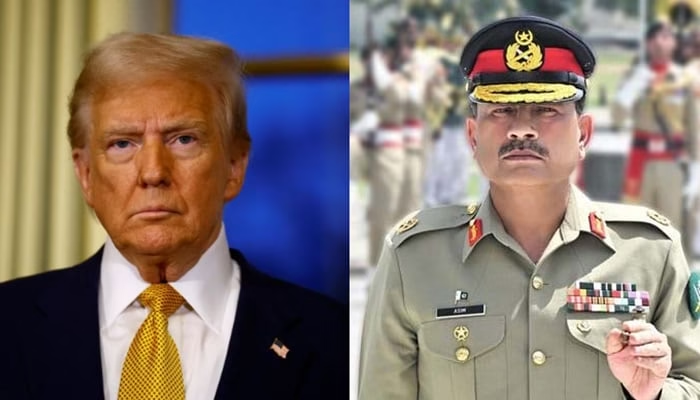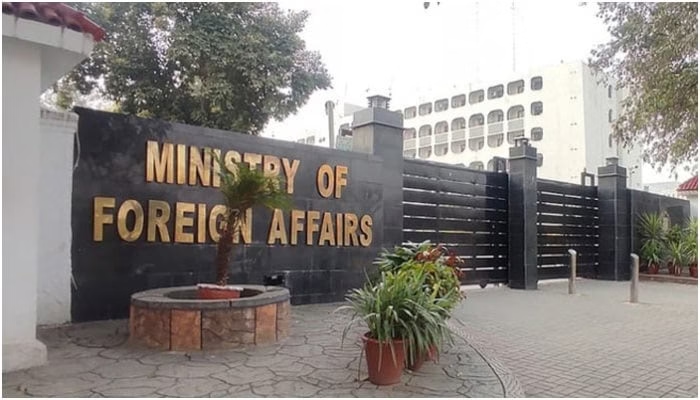In what is being hailed as a significant moment in Pakistan-US relations, Field Marshal General Asim Munir is set to meet U.S. President Donald Trump today in Washington. This high-level engagement signals a new phase of cooperation between the two nations, with key discussions expected on regional stability, economic collaboration, and emerging technologies.
The White House has officially confirmed the meeting, stating that President Trump and General Munir will hold a luncheon meeting in the Cabinet Room. While journalists will not be allowed to attend, it is anticipated that President Trump may share insights through media statements or social media posts following the discussion.
According to top U.S. security officials, the meeting is scheduled for 1:00 PM Eastern Time (approximately 10:00 PM Pakistan Standard Time). The timing of this encounter is notable, as it comes shortly after President Trump abruptly ended his visit to Canada due to heightened tensions in the Middle East. Importantly, he chose not to meet with Indian Prime Minister Narendra Modi during that trip, adding diplomatic weight to his upcoming interaction with Pakistan’s top military leader.
This will mark President Trump’s first official meeting with a high-ranking Pakistani official since returning to office — an indication of the growing strategic relevance of Islamabad in Washington’s foreign policy matrix.
Just a day prior, Field Marshal Asim Munir addressed a gathering of the Pakistani-American community in Washington, D.C. During his speech, he highlighted President Trump’s past acknowledgment of the Kashmir dispute and urged the U.S. to play a more active role in seeking a peaceful resolution. His remarks struck a chord with the diaspora and hinted at a renewed effort by Pakistan to internationalize the Kashmir issue.
The Field Marshal’s comments come at a time when both countries are exploring deeper economic ties. Munir pointed out that while the U.S. is planning to sign a mineral extraction deal with Ukraine worth $400 to $500 billion, Pakistan can offer even more lucrative opportunities. With untapped mineral reserves estimated at over one trillion dollars, Pakistan is inviting American investment with promises of high returns — up to $10 to $15 billion annually for the next century.
One of Pakistan’s key proposals is for all metal processing to occur domestically. This would not only increase profits but also boost employment and foster industrial development within the country. Munir emphasized that Pakistan is not just looking for raw resource deals but comprehensive economic partnerships that include technology transfer and local empowerment.
A groundbreaking aspect of this new relationship is the anticipated collaboration in digital innovation. General Munir revealed that agreements are in progress between the Pakistan Crypto Council and the American Crypto Council. This joint venture will pave the way for Pakistan’s formal entry into the global crypto mining ecosystem. Alongside this, Pakistan plans to establish artificial intelligence (AI) data centers to support the growing demand for tech-driven solutions in finance, health, and governance.
The Field Marshal’s strategic approach reflects a vision to reposition Pakistan as a major player in the digital and industrial economy of the future. With artificial intelligence, crypto mining, and mineral extraction as focal points, the new phase of U.S.-Pakistan engagement is poised to extend far beyond traditional military cooperation.
Additionally, this meeting underscores Pakistan’s desire for diplomatic balance and regional peace. Islamabad has welcomed President Trump’s recent calls for a ceasefire between India and Pakistan and is urging Washington to use its influence to foster long-term peace in South Asia, particularly on the unresolved Kashmir issue.
Recent visits by other Pakistani officials, including a delegation led by Bilawal Bhutto Zardari to meet State Department representatives, have further laid the groundwork for broader diplomatic and economic cooperation. The convergence of these efforts reflects Islamabad’s commitment to reset its global image and strengthen strategic alliances.
In conclusion, today’s meeting between Field Marshal Asim Munir and President Donald Trump is more than a diplomatic formality — it is a turning point that could redefine the trajectory of Pakistan-U.S. relations. As both nations navigate complex geopolitical landscapes, this high-level dialogue may unlock new opportunities for peace, progress, and prosperity on both sides.
In what is being hailed as a significant moment in Pakistan-US relations, Field Marshal General Asim Munir is set to meet U.S. President Donald Trump today in Washington. This high-level engagement signals a new phase of cooperation between the two nations, with key discussions expected on regional stability, economic collaboration, and emerging technologies.
The White House has officially confirmed the meeting, stating that President Trump and General Munir will hold a luncheon meeting in the Cabinet Room. While journalists will not be allowed to attend, it is anticipated that President Trump may share insights through media statements or social media posts following the discussion.
According to top U.S. security officials, the meeting is scheduled for 1:00 PM Eastern Time (approximately 10:00 PM Pakistan Standard Time). The timing of this encounter is notable, as it comes shortly after President Trump abruptly ended his visit to Canada due to heightened tensions in the Middle East. Importantly, he chose not to meet with Indian Prime Minister Narendra Modi during that trip, adding diplomatic weight to his upcoming interaction with Pakistan’s top military leader.
This will mark President Trump’s first official meeting with a high-ranking Pakistani official since returning to office — an indication of the growing strategic relevance of Islamabad in Washington’s foreign policy matrix.
Just a day prior, Field Marshal Asim Munir addressed a gathering of the Pakistani-American community in Washington, D.C. During his speech, he highlighted President Trump’s past acknowledgment of the Kashmir dispute and urged the U.S. to play a more active role in seeking a peaceful resolution. His remarks struck a chord with the diaspora and hinted at a renewed effort by Pakistan to internationalize the Kashmir issue.
The Field Marshal’s comments come at a time when both countries are exploring deeper economic ties. Munir pointed out that while the U.S. is planning to sign a mineral extraction deal with Ukraine worth $400 to $500 billion, Pakistan can offer even more lucrative opportunities. With untapped mineral reserves estimated at over one trillion dollars, Pakistan is inviting American investment with promises of high returns — up to $10 to $15 billion annually for the next century.
One of Pakistan’s key proposals is for all metal processing to occur domestically. This would not only increase profits but also boost employment and foster industrial development within the country. Munir emphasized that Pakistan is not just looking for raw resource deals but comprehensive economic partnerships that include technology transfer and local empowerment.
A groundbreaking aspect of this new relationship is the anticipated collaboration in digital innovation. General Munir revealed that agreements are in progress between the Pakistan Crypto Council and the American Crypto Council. This joint venture will pave the way for Pakistan’s formal entry into the global crypto mining ecosystem. Alongside this, Pakistan plans to establish artificial intelligence (AI) data centers to support the growing demand for tech-driven solutions in finance, health, and governance.
The Field Marshal’s strategic approach reflects a vision to reposition Pakistan as a major player in the digital and industrial economy of the future. With artificial intelligence, crypto mining, and mineral extraction as focal points, the new phase of U.S.-Pakistan engagement is poised to extend far beyond traditional military cooperation.
Additionally, this meeting underscores Pakistan’s desire for diplomatic balance and regional peace. Islamabad has welcomed President Trump’s recent calls for a ceasefire between India and Pakistan and is urging Washington to use its influence to foster long-term peace in South Asia, particularly on the unresolved Kashmir issue.
Recent visits by other Pakistani officials, including a delegation led by Bilawal Bhutto Zardari to meet State Department representatives, have further laid the groundwork for broader diplomatic and economic cooperation. The convergence of these efforts reflects Islamabad’s commitment to reset its global image and strengthen strategic alliances.
Today’s meeting between Field Marshal Asim Munir and President Donald Trump is more than a diplomatic formality — it is a turning point that could redefine the trajectory of Pakistan-U.S. relations. As both nations navigate complex geopolitical landscapes, this high-level dialogue may unlock new opportunities for peace, progress, and prosperity on both sides.



